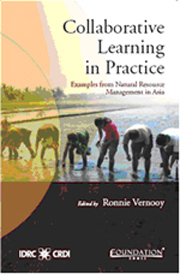Book contents
- Frontmatter
- Contents
- Foreword
- Acknowledgements
- Preface
- Chapter 1 Toward Centres of Excellence for CBNRM (Community-Based Natural Resource Management)
- Chapter 2 Participatory Research and Development in South Asia
- Chapter 3 Adaptive Learning: From Isang Bagsak to the ALL in CBNRM Programme
- Chapter 4 Mainstreaming CBNRM in Chinese Higher Education
- Chapter 5 Comparing the Case Studies
- References
- Notes on Contributors
- Index
Chapter 3 - Adaptive Learning: From Isang Bagsak to the ALL in CBNRM Programme
Published online by Cambridge University Press: 26 October 2011
- Frontmatter
- Contents
- Foreword
- Acknowledgements
- Preface
- Chapter 1 Toward Centres of Excellence for CBNRM (Community-Based Natural Resource Management)
- Chapter 2 Participatory Research and Development in South Asia
- Chapter 3 Adaptive Learning: From Isang Bagsak to the ALL in CBNRM Programme
- Chapter 4 Mainstreaming CBNRM in Chinese Higher Education
- Chapter 5 Comparing the Case Studies
- References
- Notes on Contributors
- Index
Summary
Part 1: About the case study
Rural communities and field researchers aiming to achieve sustainable management of the environment need to adapt to rapidly changing contexts of rural poverty and resource degradation. This capacity is called adaptive learning or, adaptive management. Adaptive learning is based on the premise that learning from their experiences empowers participants to respond more effectively to new uncertainties, enabling them to change old ways of doing things and allowing them to make better decisions in managing the natural resource base.
Thus learning is a knowledge enterprise where new knowledge is generated from experiences, shared through formal and non-formal channels of communication, stored, and relearned in a creative fashion. However, this is easier said than done. How this cyclical process takes place in the context of Community-Based Natural Resource Management (CBNRM), which is a social process by nature, is something that research and development agencies, academic institutions, and learning centres should explore more deeply and document it. This will allow one to understand whether contextual factors make learning possible or not.
The Adaptive Learning and Linkages in Community-Based Natural Resource Management programme (ALL in CBNRM) and its earlier phases, the Isang Bagsak programme, have tried to provide answers to this question by facilitating a regional programme in adaptive learning for CBNRM researchers and practitioners in Southeast Asia.
Information
- Type
- Chapter
- Information
- Collaborative Learning in PracticeExamples from Natural Resource Management in Asia, pp. 55 - 94Publisher: Foundation BooksPrint publication year: 2009
Accessibility standard: Unknown
Why this information is here
This section outlines the accessibility features of this content - including support for screen readers, full keyboard navigation and high-contrast display options. This may not be relevant for you.Accessibility Information
- 2
- Cited by
